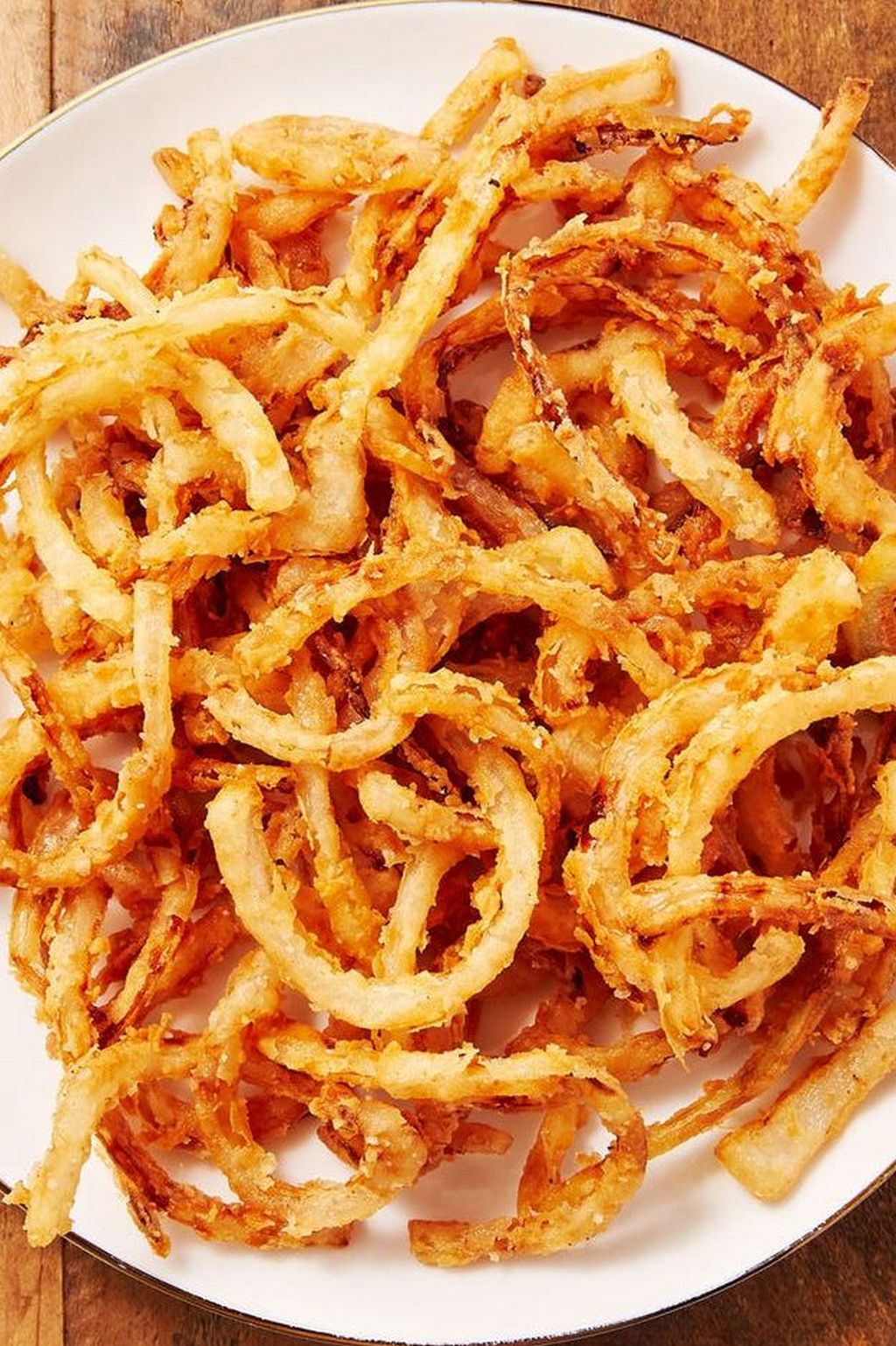Are French Fried Onions Healthy and Good for You? The Surprising Truth Revealed

When it comes to food, there’s always a constant battle between indulgence and nutrition. And one such item that often finds itself at the center of this debate is French fried onions. These little onion rings have become a staple in many households and restaurant menus. They are known for their crispy texture and mouth-watering flavor. But amidst all the deliciousness, it begs the question: are French fried onions bad or good for you?
We’ll uncover the truth about these beloved golden gems. We’ll delve into both sides of the argument with an open mind and evidence-based analysis. We’ll explore not only their potential health benefits but also any drawbacks they might pose to your overall well-being.
If you’ve ever found yourself torn between savoring that extra crunchy onion topping on your favorite dish or wondering if it’s time to give them up altogether, grab a seat. We’re about to embark on a culinary journey.
Introduction to French Fried Onions

French fried onions, also known as crispy fried onions or just fried onions, have become a staple in many kitchens around the world. With their crunchy texture and savory flavor, they add a delightful twist to various dishes. This popular ingredient is believed to have originated in France during the 19th century. It was commonly used as a garnish for soups and salads.
Over time, the versatility of French fried onions has expanded beyond just being a topping. They are now widely incorporated into numerous recipes. For example, classic green bean casserole during Thanksgiving dinners and gourmet pork tenderloin with French fried onions at trendy restaurants. The appealing aroma and golden-brown color of these crispy delights instantly elevate any dish they adorn.
Despite their popularity in modern cuisine, it’s important to explore whether French fried onions offer any nutritional benefits. It’s also important to consider if they should be approached with caution due to potential health risks.
In this article, we will delve deeper into their composition. We will also discuss studies that shed light on both sides of the debate surrounding this beloved ingredient. By understanding how French fried onions impact our health, we can make informed choices about including them in our diet without compromising overall well-being.
Are French Fried Onions Healthy and Good for You?
French fried onions, while delicious, aren’t the healthiest option. Here’s why:
- High Calorie and Fat Content: A serving of French fried onions packs around 7 grams of fat, primarily from vegetable oil. This can contribute to high calorie intake, which may not align with health goals.
- Sodium Concerns: Additionally, these onions can be high in sodium. That’s a concern for those watching their salt intake due to its potential impact on blood pressure and heart health.
- Unhealthy Additives: Some variations of French fried onions may contain artificial trans fats and added sugar, further diminishing their nutritional value.
Moderation is Key: French fried onions add flavor and crunch to dishes. However, it’s essential to consume them in moderation as part of a balanced diet. Pair them with healthier options. Opt for homemade alternatives to mitigate their less desirable nutritional aspects.
Nutritional Profile of French Fried Onions
French fried onions are a crunchy, flavorful addition to various dishes. However, their nutritional profile requires attention. Primarily composed of thinly sliced onions, battered, and deep-fried, they boast a rich taste but also pack a punch in fat and calories.
When it comes to fat content, French fried onions do carry some weight. The frying process gives them their irresistible crunch but also causes them to absorb oil. As a result, every ounce can contribute about 7 grams of fat—primarily unhealthy saturated fats that should be limited in a balanced diet.
Despite their indulgent nature, French fried onions do offer some nutritional benefits. They contain small amounts of essential vitamins and minerals, including vitamin C, vitamin B6, and potassium. While not a significant source, these nutrients contribute to overall health when consumed as part of a balanced diet.
However, it is important to remember that French fried onions are high in fat and calories, so you should think about adding them to meals. Pair them with lighter fare or use them as a garnish rather than a main ingredient. This can help manage overall calorie intake while still enjoying their savory crunch. Below is a summary of the nutritional content of French fried onions:
| Nutrient | Amount per 1 oz (28g) |
| Calories | ~150 |
| Total Fat | ~7g |
| Vitamin C | Small amount |
| Vitamin B6 | Small amount |
| Potassium | Small amount |
| Also see: Check if French’s Fried Onions Are Vegan and Cruelty-Free |
Potential Health Benefits of French Fried Onions
French fried onions are often associated with indulgence and decadence. Surprisingly, they offer some potential health benefits. While they may not be considered a superfood by any means, these crispy onion rings can still bring something valuable to the table.
Onions themselves are rich in essential vitamins and minerals such as vitamin C, vitamin B6, and folate. These micronutrients play crucial roles in supporting overall bodily functions. They also promote good health. By consuming French fried onions in moderation, you can incorporate small amounts of these nutrients into your diet.
In addition, French fried onions may have antioxidants. This could potentially benefit your health. Antioxidants are compounds that help neutralize harmful free radicals in the body, reducing oxidative stress and its associated damage to cells.
Frying onions can reduce antioxidants. Compared to raw or lightly cooked versions, studies have shown that deep-fried onions still contain trace amounts of antioxidants. |
While these potential health benefits exist with French fried onions, it’s important to note that they should be enjoyed as part of an overall balanced diet. They shouldn’t be relied upon solely for their nutritional value.
Health Risks Associated with Consumption French Fried Onions
French fried onions are a popular addition to many dishes, adding a crunchy texture and savory flavor. However, it’s important to be aware of the potential health risks associated with consuming these fried treats.
One of the main concerns when it comes to French fried onions is their high calorie and fat content. These crispy delights are typically deep-fried in oil, which adds significant calories and unhealthy fats to your meal. Consuming excessive calories can lead to weight gain. It also increases the risk of chronic conditions such as obesity, diabetes, and heart disease.
Additionally, French fried onions often contain high levels of sodium. Salt is commonly used in the production process to enhance flavor and preservation. Excessive sodium intake can contribute to increased blood pressure levels. This puts strain on your cardiovascular system.
In addition, packaged French fried onion products may contain artificial additives or preservatives to extend shelf life. These additives serve various purposes, like enhancing flavor or prolonging freshness. However, they may have negative effects on health if consumed regularly or in large quantities.
To mitigate these risks while still enjoying the taste and texture that French fried onions add to meals, moderation is key. You can consider making homemade versions using healthier cooking methods, such as baking instead of frying. Additionally, opting for fresher alternatives like caramelized onions or sautéed mushrooms can provide similar flavors. This doesn’t compromise on nutrition.
| Related: Do French Fried Onions Go Bad and Expire? |
Eating Healthy: Moderation and Portion Control
Moderation and portion control are essential when it comes to enjoying French fried onions as part of a well-balanced diet. While these crispy, flavorful toppings can add a delicious crunch to salads, burgers, or casseroles, it’s important not to overindulge.
Consuming excessive amounts of this high-calorie food can contribute to weight gain and increase the risk of developing obesity-related health issues such as heart disease and diabetes.
However, this doesn’t mean you have to completely cut French fried onions out of your diet. By practicing moderation and portion control, you can still savor their taste without compromising your health goals. Consider adding just a small handful as a garnish or mixing them with other healthier options like fresh vegetables or whole grains. This way, you can enjoy the flavor while also ensuring that your overall calorie intake remains within healthy limits.
| Related: Can You Eat French Fried Onions Raw Out of the Can? |
Cooking Options: Healthier Alternatives to French Fried Onions
For those who want to enjoy the delicious flavors of French fried onions while minimizing potential health risks, several alternative cooking options can provide a healthier choice.
One such option is baking the onions instead of frying them. You can achieve a similar crispy texture by cutting the onions into thin slices. Toss them with a small amount of olive oil. This method uses less oil. Simply spread the onion slices on a baking sheet and bake in a preheated oven until they turn golden brown.
Another option is to try air-frying French fried onions. Air fryers have gained popularity in recent years as they require little to no oil and still manage to produce crispy results. To make crunchy, flavorful French fried onions in an air fryer, toss thinly sliced onions with some cornstarch or flour. Spread them out in a single layer in the air fryer basket. Cook at around 400°F (200°C) for about 15-20 minutes, shaking halfway through, until they become crispy and golden brown.
Lastly, if you prefer convenience but want to minimize potential health risks, consider purchasing store-bought baked onion crisps. You can also try using dried onion flakes. These options typically have fewer calories and less fat compared to traditional deep-fried versions while still providing that satisfying crunch.
| Read: What Are Frizzled Onions at Panera? |
Healthy Alternatives to French Fried Onions
When looking for healthier alternatives to French fried onions, there are plenty of flavorful options to consider. Here are some alternatives to using French fried onions as a topping:
- Crispy Baked Onions: Thinly slice onions, toss them in a bit of olive oil, and bake until crispy for a nutritious alternative to fried onions.
- Toasted Panko Crumbs: Toasted panko crumbs seasoned with herbs and spices can add a satisfying crunch to dishes without the excess fat.
- Sautéed Onions: Sauté onions in a non-stick skillet with a touch of olive oil until caramelized for a sweet and savory topping.
- Roasted Garlic: Roasted garlic cloves mashed and spread over dishes offer a rich flavor without the need for fried toppings.
Incorporating onions into meals in a more nutritious way can elevate flavor while boosting health benefits:
- In Salads: Add raw or lightly pickled onions to salads for a zesty kick.
- In Soups and Stews: Sauté onions as a base for soups and stews to enhance depth of flavor without excessive calories.
- In Stir-Fries: Incorporate onions into stir-fries along with other vegetables and lean proteins for a nutritious one-pan meal.
- As a Garnish: Finely chopped green onions or chives make a nutritious and colorful garnish for various dishes.
By choosing these alternatives and using onions creatively in meals, you can enjoy the flavor and nutrition.
Conclusion
After examining both sides of the argument, it is clear that consuming French fried onions can have both health benefits and potential risks. French fried onions provide essential nutrients like iron, fiber, and vitamins C and K. They also add flavor and crunch to meals, making them a popular choice for many dishes.
However, it is important to note that these onions are often deep-fried in oil, which significantly increases their calorie content. This can contribute to weight gain if consumed excessively. Additionally, the frying process leads to the formation of acrylamide, a potentially harmful chemical compound linked to cancer in animal studies.
In light of these findings, moderation is key when including French fried onions in your diet. Enjoy them as an occasional indulgence or garnish. This may help mitigate any negative effects associated with their consumption. Overall, it’s recommended to prioritize whole foods, like fresh vegetables, for optimal health. Processed options like French fried onions are less ideal.
Remember that no single food alone determines overall health. A balanced diet rich in fruits, vegetables, lean proteins, and whole grains should always form the foundation of your eating habits. As with any dietary decision, vary your choices. Be mindful of portion sizes. This will pave the way towards maintaining a healthy lifestyle.






